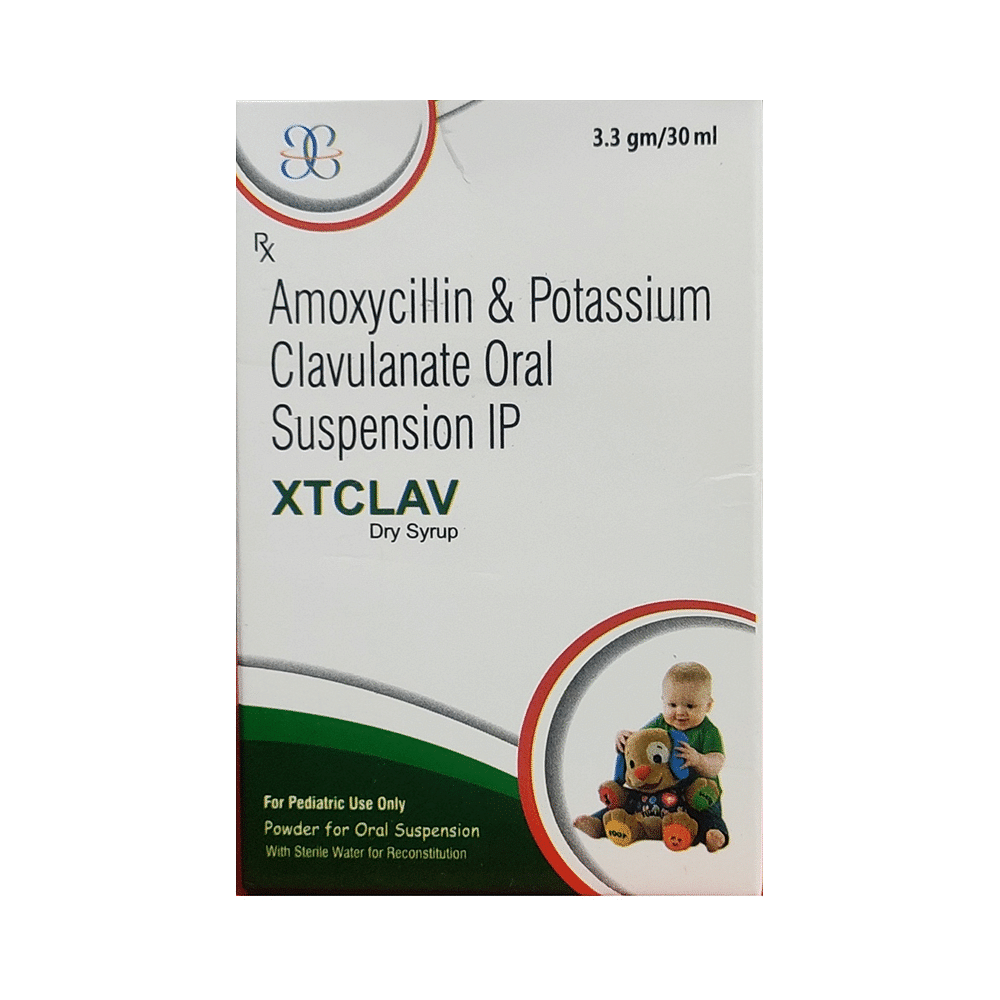
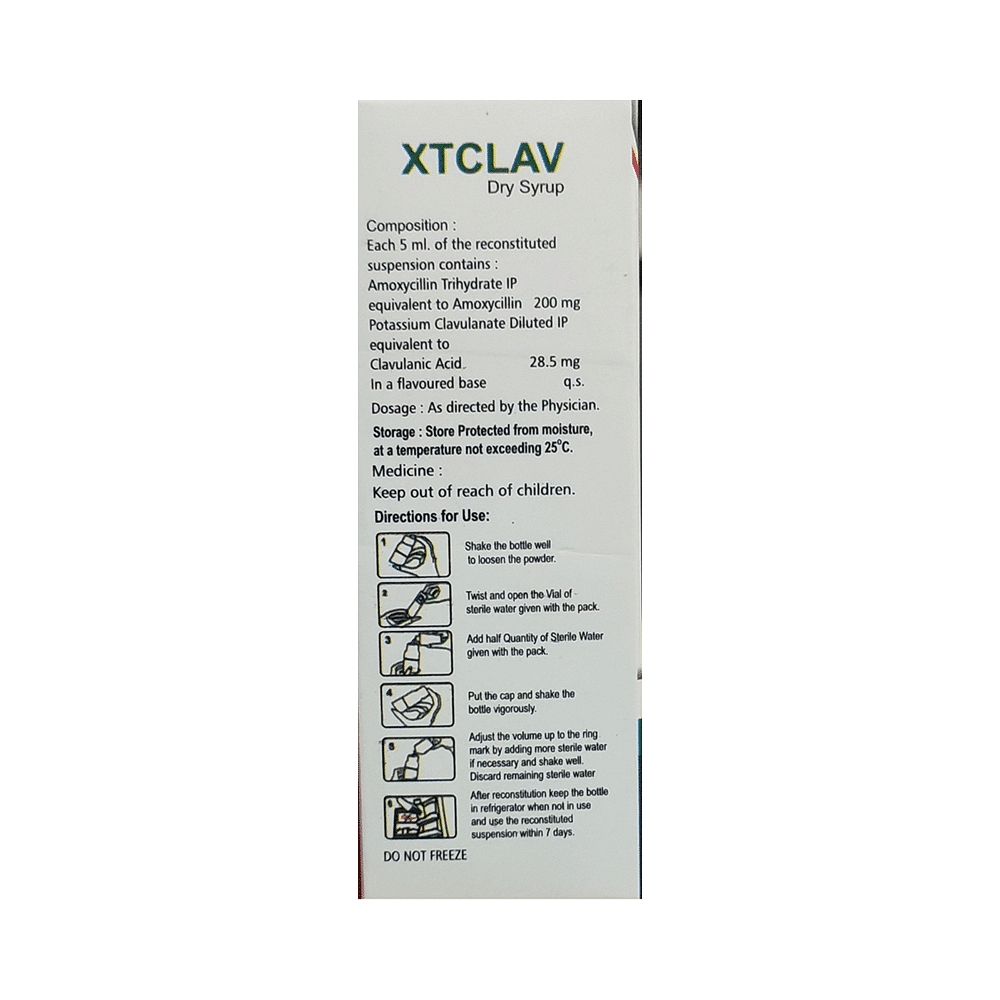
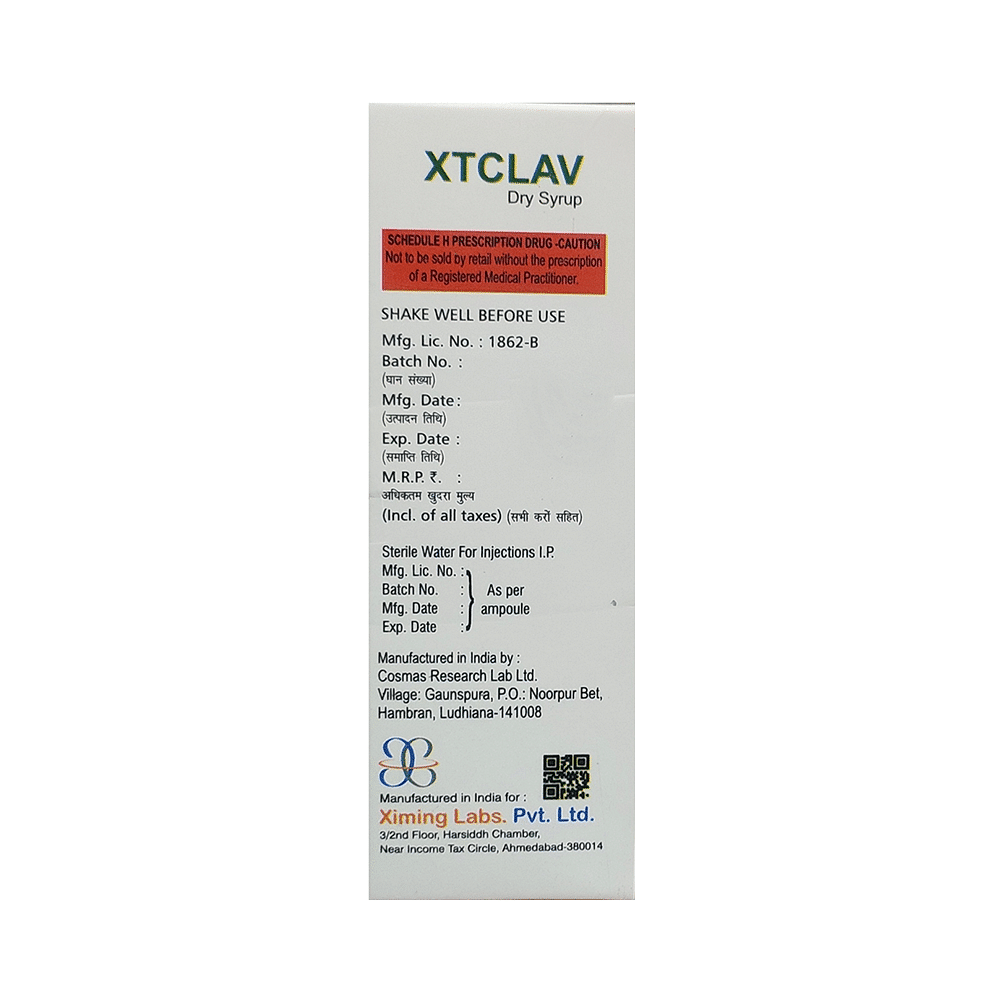
Xtclav Dry Syrup
Manufacturer
Ximing Labs Pvt Ltd
Salt Composition
Amoxycillin (200mg/5ml) + Clavulanic Acid (28.5mg/5ml)
Key Information
Short Description
Xtclav Dry Syrup is an antibiotic medicine that helps treat bacterial infections of the ear, nose, throat, chest, lungs, teeth, skin, and urinary tract.
Dosage Form
Oral Suspension
Introduction
Xtclav Dry Syrup is an antibiotic medicine that helps treat bacterial infections of the ear, nose, throat, chest, lungs, teeth, skin, and urinary tract. It is capable of killing bacteria that have become resistant to other therapies and thus also helps treat tuberculosis that is resistant to other treatments. You can give Xtclav Dry Syrup to your child with or without food. It is better to give it with food as that helps increase absorption and decrease the risk of stomach upset. The doctor may prescribe giving it two to three times a day. Medicine dose depends on the severity of the infection, its type, and your child’s body weight and age.
Directions for Use
Take this medicine in the dose and duration as advised by your doctor. Check the label for directions before use. Measure it with a measuring cup and take it by mouth. Shake well before use. Xtclav Dry Syrup is to be taken with food.
Safety Information
Side Effects
Vomiting Diarrhea Nausea Abdominal pain Allergy
Alcohol Warning
It is not known whether it is safe to consume alcohol with Xtclav Dry Syrup. Please consult your doctor.
Breastfeeding Warning
Xtclav Dry Syrup is safe to use during breastfeeding. Human studies suggest that the drug does not pass into the breastmilk in a significant amount and is not harmful to the baby.
Pregnancy Warning
Xtclav Dry Syrup is generally considered safe to use during pregnancy. Animal studies have shown low or no adverse effects to the developing baby; however, there are limited human studies.
How it works
Xtclav Dry Syrup is an antibiotic. It has two active agents, amoxycillin and clavulanic acid. Amoxycillin works by preventing the formation of the bacterial protective covering (cell wall) essential for the survival of the bacteria. Whereas clavulanic acid serves a special purpose of inhibiting an enzyme (beta-lactamase) that is produced by resistant bacteria. This makes the combination of amoxycillin and clavulanic acid an effective line of treatment for many types of infections.
Quick Tips
Your child must complete the entire course of antibiotics. Stopping too soon may cause the bacteria to multiply again or cause another infection. Eating citrus fruit or sipping plenty of water or fruit juice may help if your child has a bitter taste in the mouth after taking Xtclav Dry Syrup. Encourage your child to drink plenty of water in case diarrhea develops as a side effect. Never give Xtclav Dry Syrup until and unless prescribed by the doctor. Do not give Xtclav Dry Syrup to treat common cold and flu-like symptoms caused by viruses. Never save medicine for future illnesses. Check ‘expiry’ before giving Xtclav Dry Syrup to your child. Immediately discard all the expired medicines. Stop Xtclav Dry Syrup immediately if your child develops an itchy rash, facial swelling, or breathing difficulty.
Related Medicines

Omexin Oral Suspension

Moxiport-CV Dry Syrup

Benoxy-CV Dry Syrup

Stermentin Oral Suspension

Mili-CV Dry Syrup

Zymox-CV Oral Suspension
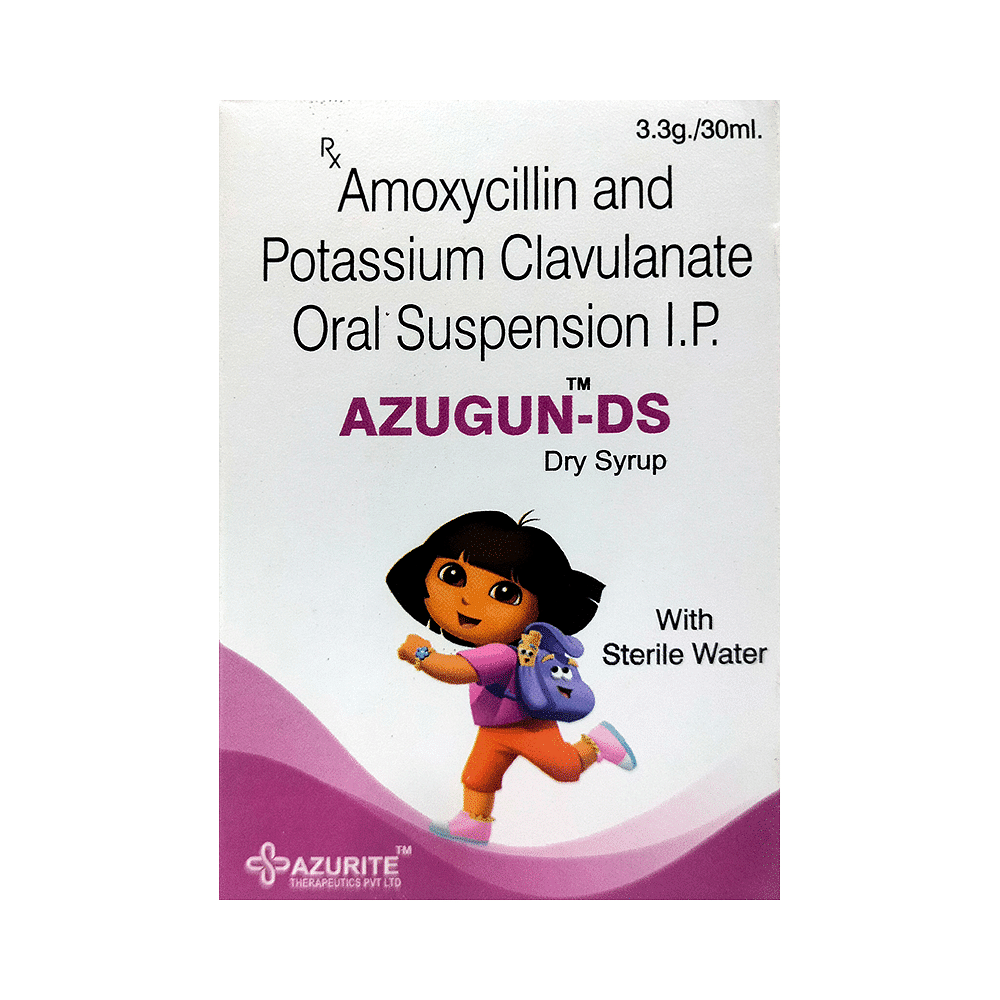
Azugun-DS Dry Syrup

Boncillin-CV Dry Syrup

Invumox Drop
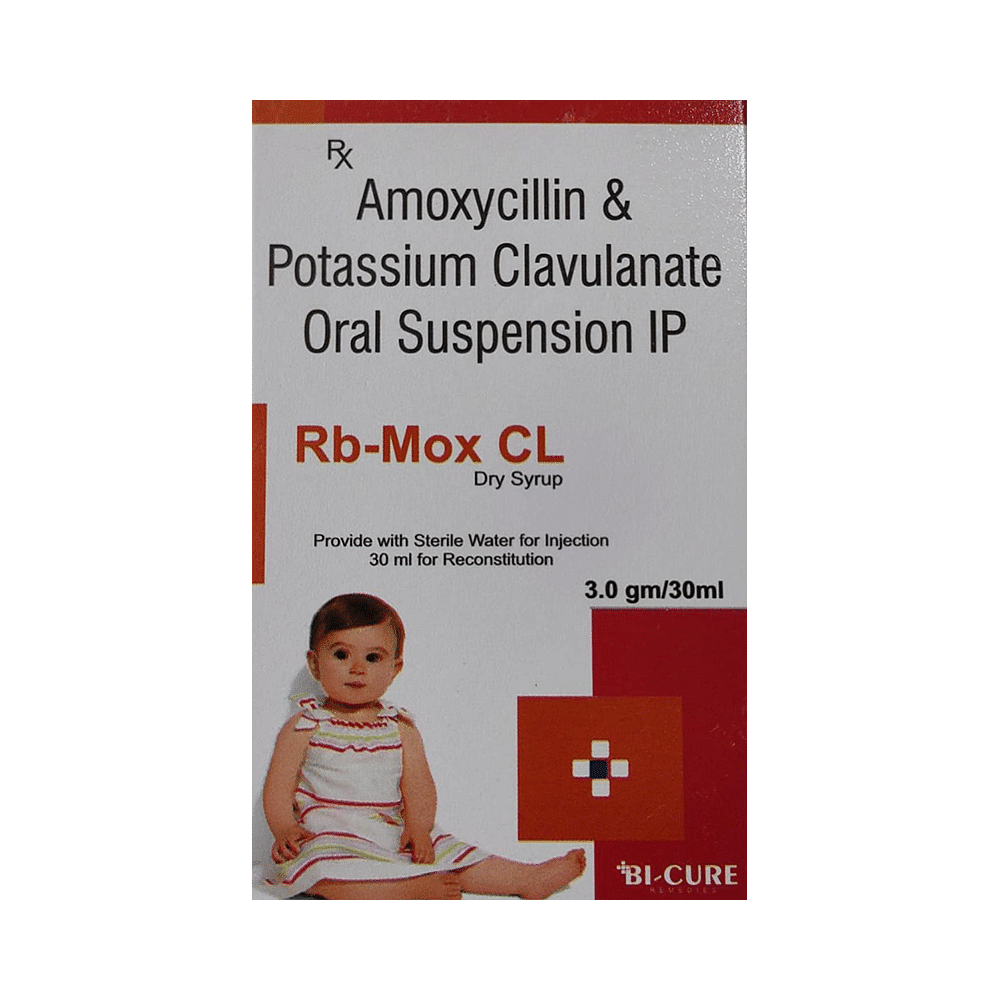
Rb-Mox CL Dry Syrup
Frequently asked questions
Can other medicines be given at the same time as Xtclav Dry Syrup?
It is essential to inform your child's doctor about any other medications they may be taking before starting Xtclav Dry Syrup. Additionally, consult with the doctor before giving any medicine to your child, as interactions can occur.
Can I get my child vaccinated while on treatment with Xtclav Dry Syrup?
Generally, antibiotics do not interfere with vaccines or cause adverse reactions in children who have recently been vaccinated. However, it is recommended to wait until the illness has subsided before administering a vaccine.
Which lab tests may my child undergo while taking Xtclav Dry Syrup on a long-term basis?
During prolonged therapy, your child's doctor may periodically monitor kidney and liver function tests to ensure their condition remains stable.
Can I give a higher than the recommended dose of Xtclav Dry Syrup to my child?
Giving a higher dose than recommended can increase the risk of side effects. If you notice increased symptoms, consult with your doctor for re-evaluation.
Can I stop giving Xtclav Dry Syrup to my child when the symptoms are relieved?
Do not discontinue treatment unless the full course is completed, even if symptoms seem to have improved. The infection may still be active, and the medication can continue to show beneficial effects.
Can the use of Xtclav Dry Syrup cause diarrhea?
Yes, Xtclav Dry Syrup may cause diarrhea due to its antibiotic properties and impact on helpful bacteria in your child's stomach. Encourage your child to drink plenty of water or other fluids if diarrhea occurs. If dehydration symptoms arise (less frequent urination with dark-colored urine), consult with a doctor.
Do all viral common colds result in secondary bacterial infection?
Mostly, bacterial infections do not follow viral infections. However, antibiotics should only be used after consulting with your child's doctor to avoid potential side effects.
The mucus coming out of my child’s nose is yellow-green. Is it a sign of a bacterial infection?
Yellow or green mucus does not necessarily indicate the need for antibiotics. This can occur during a common cold, and symptoms often last 7-10 days.
Is there any sign which shows that my child needs immediate medical attention?
Seek immediate medical attention if your child experiences severe allergic reactions (breathing difficulties, skin rashes), gastrointestinal infections (diarrhea), or liver damage (weakness, paleness, vomiting).


